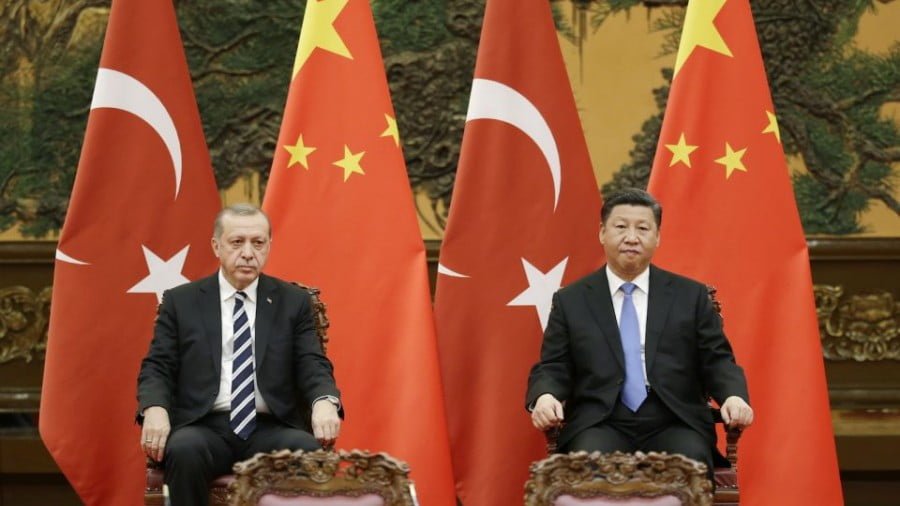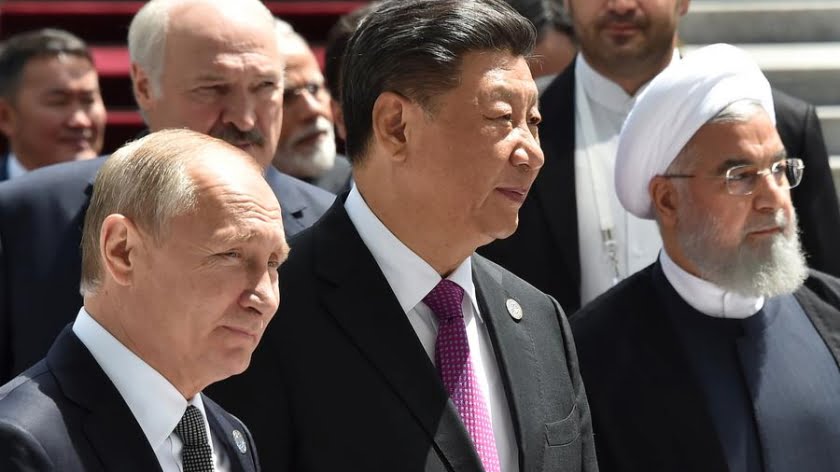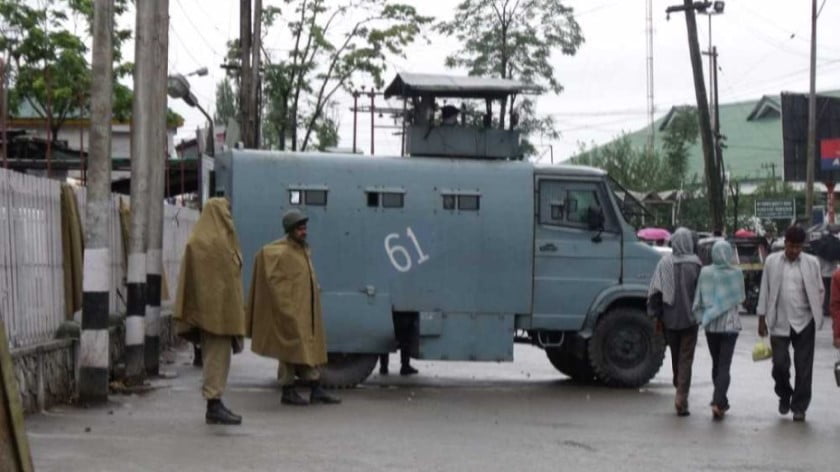In Misnamed ‘Kyiv’, a Meeting of Titans Generates a Disgusting Racist Slur
If there ever was doubt whether Senator Lindsey Graham was a certified moron, the issue is now resolved, Stephen Karganovic writes.
If there ever was doubt whether Senator Lindsey Graham was a certified moron, the issue is now resolved. As for his host in “Kyiv,” there never was any dilemma in that regard.
Readers ought to be reminded that there was a time, which in historical terms was not long ago, when the U.S. Senate had in its ranks distinguished members who inspired pride. These were men of very diverse political views, but they were all without exception devoted to public service: Everett Dirksen, Thomas Mansfield, Henry Jackson, William Fulbright, Hubert Humphrey, the distinguished list could go on. They were men of integrity, vision, and intellect and their public statements had corresponding weight. They were all literate and articulate.
The Senate today is collectively represented and institutionally embarrassed by a nitwit and moral cripple of the calibre of Lindsey Graham.
During his recent visit to Kiev, not “Kyiv” of course, where he was hosted by another crackpot, Graham made remarks that delighted the 15% of the world that still pays attention to such drivel but managed to disgust the remainder of the planet. Graham drooled over “killing Russians” and praised the extermination of that particular ethnicity as “the best investment we had ever made.” His uncivilised rant has appropriately gone viral.
There is some uncertainty about the second part of the statement attributed to vulgarian Graham because it appears to have been shot from a different angle, raising the possibility that his Ukrainian hosts, not known for scruples or delicacy, for their own propaganda purposes may have spliced together two different parts of the same conversation. But be that as it may, the part about “killing Russians” is incontrovertibly recorded and reiterates similar sentiments expressed by Graham elsewhere. He had previously taken the identical position, albeit even more forcefully, by endorsing the killing of, as he put it, “tons of Russians.” “Tons” adds a lovely literary flourish, and by a noted stylist, in contrast to just killing them off, generically.
Whether or not Graham explicitly referred to the slaughter of human beings who have done him no harm as the “best investment” may be factually debatable, but that as an agent of the military-industrial complex and an uncouth vulgarian he privately thinks along precisely such lines is a certainty.
The central feature (in this case it would be awkward to call it a nuance) of that part of the public statement in Kiev that undeniably is attributable to Graham is his exhortation to “kill Russians.” Substitute any nation or race for the “Russians,” and the crudity of his speech will be manifest. Graham’s homicidal incitement is indiscriminate. He does not even bother to qualify it by restricting its application to combat personnel. No, he makes it general and as stated it impacts each and every member of the targeted group, including schoolchildren and grandmothers.
Is it safe to entrust the making of laws and management of public affairs to this unbalanced person? If still in doubt, see here and here.
The prudent decision of Russia’s judicial authorities to issue an arrest warrant for the apprehension of this potentially dangerous serial offender and reckless warmonger comes therefore as a relief. The sooner this man is off the streets the safer everyone in South Carolina and the world assuredly will be.
Is it possible for a once august political institution to fall lower than Lindsey Graham? It sounds unlikely, but in this case we should keep an open mind.
And what have the good people of South Carolina got to say about this? Do they support the primitive outbursts of the man who formally represents them and speaks in their name? Are they prepared to share the moral opprobrium for their favourite son’s remarks?
The next election will show, but in the current atmosphere the prospect of mass desertion or public disapproval of Graham by his more decent constituents is slim.
As he backtracked from the more embarrassing implications of his reckless statements, Senator Graham came up with the flimsy afterthought that his support for the Ukrainian neo-Nazi regime is motivated by adherence to the philosophical principle of the American Revolution, “be free or die.” That sounds like an extremely amateurish fusion of very incompatible elements, George Washington and Stepan Bandera. But if Graham is such a passionate believer in core American values, did he raise with his Ukrainian host an issue that falls squarely within their ambit? Did he bother to inquire about the detention and current condition of U.S. citizen Gonzalo Lira, who was arrested by the Ukrainian secret police SBU over a month ago and has since disappeared without a trace? Did he raise the issue of the confinement of the Kiev Pechersk monastery abbot, Metropolitan Paul, and did he ask his host why the abbot’s monks and seminarians are denied access to monastery facilities? Does Senator Graham care for freedom of religion as much as the people of South Carolina are known to do? To put it another way, is he working for them, or for someone else? Or did Graham confine his conversation in “Kyiv” to public calls for racially motivated killing and expressions of glee over the monetary return his campaign contributors are reaping on their investment in the Ukrainian mayhem?
It so happens that unbeknownst to the uncultured oaf Lindsey Graham, Russia – Holy Russia, if you will – has a fitting and civilised response to his primitive rantings. It was composed two hundred years ago by the poet Alexander Pushkin. His verses are entitled “To the Slanderers of Russia” (Клеветникам России) and they seem to have been written just for Lindsey Graham and his innumerable clones. Let us listen to the great poet:
Why rave ye, babblers, so — ye lords of popular wonder?
Why such anathemas ‘gainst Russia do you thunder?
What moves your idle rage? Is’t Poland’s fallen pride?
‘T is but Slavonic kin among themselves contending,
An ancient household strife, oft judged but still unending,
A question which, be sure, you never can decide.
For ages past still have contended,
These races, though so near allied:
And oft ‘neath Victory’s storm has bended
Now their, and now our side.
Which shall stand fast in such commotion
The haughty Liakh, or faithful Russ?
And shall Slavonic streams meet in a Russian ocean? –
Or il’t dry up? This is point for us.
Leave us!: Your eyes are all unable
To read our history’s bloody table;
Strange in your sight and dark must be
Our springs of household enmity!
To you the Kreml and Praga’s tower
Are voiceless all, you mark the fate
And daring of the battle-hour
And understand us not, but hate.
What stirs ye?
Is it that this nation,
On Moscow’s flaming walls, blood-slaked and ruin-quench’d,
Spurn’d back the insolent dictation
O Him before whose nod ye blenched?
Is it that into dust we shatter’d,
The Dagon that weigh’d down all earth so wearily,
And our best blood so freely scatter’d,
To buy for Europe peace and liberty?
Ye’re bold of tongue — but hark, would ye in deed but try it
Or is the hero, now reclined in laurelled quiet,
Too weak to fix once more, Izmail’s red bayonet?
Or hath the Russian Tsar ever, in vain commanded?
Or must we meet all Europe banded?
Have we forgot to conquer yet?
Or rather, shall they not, from Perm to Tauris’ fountains,’
From the hot Colchian steppes, to Finland’s icy mountains,
From the grey, half-shatter’d wall,
To fair Kathay, in dotage buried
A steely rampart, close and serried,
Rise, Russia’s warriors, one and all?
Then send your numbers without number,
Your madden’d sons, your goaded slaves,
In Russia’s plains there’s room to slumber,
And well they’ll know their brethren’s graves!
In the first verse, substitute Ukraine for Poland, and everything will come into focus, perhaps even to the sharp intellectual mind of Lindsey Graham. He, his handlers, and the rest of their ilk, instead of wasting their time with prepared BS briefings would benefit far more from reading what Alexander Pushkin had to say to them about this and many other things.







